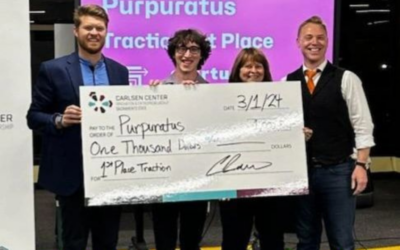Blog
Solar Breakthroughs: Record Growth and Innovations Unveiled
Solar innovation, manufacturing, and adoption are growing faster than ever. Over 30 gigawatts of PV were added in 2023, setting a record in residential and utility segments. The recent CleanStart Meetup featured this whirlwind of innovation, focusing on the latest...
Unlocking Sustainable Energy through Material Innovations
In case you missed it, Zack Spencer of NZT Group joined the CleanStart Perspective and delved into how material science is accelerating the energy transition. At NZT Group they are working on groundbreaking advancements in energy storage and materials science that are...
Tzvi Weber Wins $1,000 in Startup Challenge
Congratulations to one of our Clean Tech CEO Crash Course participants, Tzvi Weber. He just won $1000 from the regional StartUp Challenge. That Challenge brought together 11 innovative teams, split into two cohorts: Catalyst and Traction. The Traction Cohort...
Sierra Energy Making Steady Progress
It’s Great to Own a Railroad: Sierra Energy Making Steady Progress We recently dropped in on Sierra Energy to get an update on what local environmental champion Mike Hart is doing in his pursuit of a novel waste gasifier. He has made great progress in the past few...
We Boldly Go…Where Others Don’t
Once again we gazed into our crystal ball and came up with more predictions for the coming year–this time we have eleven. Will higher utility rates let the rooftop solar industry bounce back? Will new EV prices drop? Will Texas overtake California as the leader in...
Commercial Long Duration Storage Advancing
We just had a stimulating discussion of some of the latest advances in an important storage technology. The storage systems now being installed on the grid are not adequate to deal with extended and extreme events that threaten the steady supply of power. One of the...
Long Duration Storage
“Solar doesn’t work at night!”... the refrain of Renewable Energy detractors. We all know this and we all should know that storage is a solution to intermittent renewables. Specifically, Long-duration energy storage. It plays a crucial role in unlocking the full...
Wind Harvest Passes Big Milestone
Patience, persistence, and optimism are paying off. Wind Harvest has managed to get to Technology Readiness Level (TRL) 7 with its vertical axis wind turbine (VAWT) technology. That means that they have tested a full-scale prototype in commercial conditions. That...
Prediction Results 2023
2023 Predictions Recap Last year we looked to make bolder predictions, many around falling prices. Well, some predictions were right, others were wrong. There was good news from Rivian and vigorous growth in battery deployment, keeping prices high. The PPA price...









